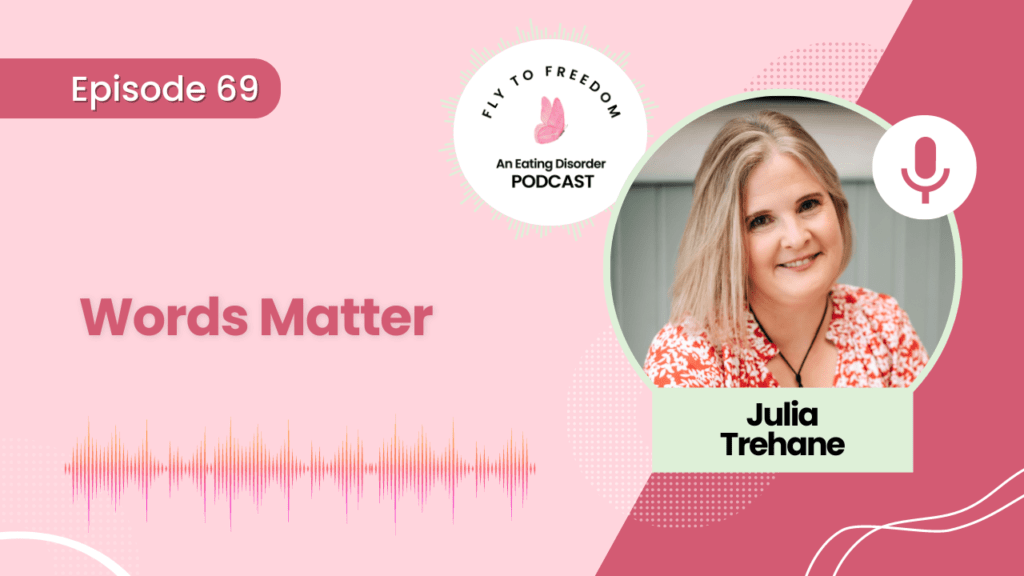The Science of Words in Eating Disorder Recovery
When you’re recovering from an eating disorder, like anorexia, the language we use can profoundly impact our healing journey. Words influence our mindset, shape our self-perception, and either pave the way to recovery or reinforce the disorder’s grip.
Science tells us that the way we communicate with ourselves, known as self-talk, has a significant impact on both our mental and physical health. Anorexia is often fueled by negative self-talk and self-deprecating beliefs that manifest in harmful behaviors. However, recovery is possible by harnessing the power of positive language, reshaping our thought patterns, and creating a nurturing mental environment.
As an anorexia recovery coach, I work with individuals to help shift their inner dialogue and external communication toward more positive and supportive language. By embracing these practices, you can begin to transform your relationship with food, your body, and yourself.
The Science Behind Self-Talk
Our brains are wired to respond to the thoughts and language we use daily. Cognitive-behavioral therapy (CBT), a widely used and research-backed treatment approach for eating disorders, emphasizes the link between thoughts, feelings, and behaviors. In eating disorders, negative self-talk drives emotions like guilt, shame, or anxiety, which then fuel disordered behaviors such as restricting, bingeing, or purging.
Studies show that negative self-talk intensifies the cycle of an eating disorder by lowering self-esteem and reinforcing harmful behaviors. Conversely, fostering positive self-talk can be a game-changer for those in recovery. Shifting internal dialogue to affirmations, self-compassion, and constructive language helps create a mindset more conducive to healing. Positive self-talk reduces feelings of anxiety and shame, and rewires the brain to encourage healthy behavior patterns.
Affirmations and Neuroplasticity
Affirmations are a simple yet powerful tool to rewire the brain. By regularly repeating positive statements, such as “I am deserving of recovery,” we can actually form new neural connections that reshape our beliefs. This process, known as neuroplasticity, helps create a more resilient, self-compassionate mental framework. Studies demonstrate that the consistent practice of affirmations not only boosts self-esteem but also enhances overall mental health, which is crucial for eating disorder recovery.
For example, replacing “I can’t recover” with “I am capable of healing” signals to the brain that change is possible. Over time, these affirmations can shift your mindset from defeat to empowerment, making recovery feel more achievable.
The Role of Language in External Communication
Beyond self-talk, the language we use when speaking with others can also influence our recovery. Words like “always” or “never” create rigid and negative narratives that contribute to feelings of hopelessness. In contrast, adopting solution-focused language can open the door to healing.
For instance, instead of saying, “I will never have a normal relationship with food,” shift to, “I am learning to trust my body’s signals and nourish myself.” This subtle but powerful change fosters a mindset of progress and hope rather than despair.
If you find yourself struggling with negative language, reaching out for support can help. As an anorexia recovery coach, I offer personalized guidance to help reframe these negative patterns, whether through one-on-one coaching or through my podcast, which dives deeper into these topics.
How Language Shapes Our Body Image
Many people with anorexia or other eating disorders experience negative body image, and the way we talk about our bodies plays a significant role in shaping that perception. Research on body image has shown that consistent negative self-statements, such as “I hate my body” or “I am too fat,” contribute to a distorted body image and perpetuate eating disorders.
Instead, shifting to body-neutral or body-positive language, like “My body is working hard for me, and I am learning to respect it,” helps create a healthier relationship with your body. This change encourages a growth mindset, where recovery becomes a process of learning to appreciate your body, rather than punishing it.
5 Action Points for Empowering Language to recover from anorexia or any other eating disorder
- Identify Your Negative Self-Talk: Start by noticing the critical language you use toward yourself. Write down these negative statements and challenge them with more compassionate alternatives. Shifting from “I can’t recover” to “I am taking steps toward recovery” is a powerful first step.
- Practice Daily Affirmations: Create a list of affirmations that resonate with your recovery goals. Repeat them regularly—both out loud and mentally. Statements like “I am worthy of nourishment” and “I trust my body” can create lasting change.
- Reframe Your Language Around Food: Words like “bad” or “unhealthy” around food can fuel disordered eating. Instead, focus on how different foods can nourish and support your body. For example, change “I can’t eat that” to “I choose to nourish my body.”
- Seek Positive Support: Surround yourself with people who uplift you and use language that supports your recovery. My podcast offers a wealth of resources and positive reinforcement to guide you through your journey, and I also share daily mantras to keep you grounded via my email list.
- Be Patient With Yourself: Changing how we speak to ourselves takes time. Practice self-compassion and celebrate your progress. Each step toward using empowering language is a victory on the path to recovery.
I recorded this podcast which accompanies this article. To Listen, just click on the image.
Start Your Healing Journey Today
Recovery from anorexia or any eating disorder is a deeply personal journey, but you don’t have to do it alone. As a coach specializing in eating disorder recovery, I’m here to support you every step of the way. Whether through personalized coaching, listening to my podcast, or following my daily mantras, you can find the guidance and encouragement you need.
Words are powerful, and by shifting how we talk to ourselves and others, we can create a more supportive, healing environment. Take that first step today by signing up for my email list, where I share daily affirmations and insights to help you on your recovery journey.
Listen to my podcast and follow me on Instagram @JuliaTrehane for daily inspiration and support. You can also sign up for my Daily Love email series at the bottom of this page.
By embracing the power of language, we can rewrite our stories, transform our lives, and achieve lasting recovery.
If you’d like me to help you through your recovery, with proper, effective, science backed techniques and everything you need to create a better life, free from your eating disorder, reach out to me and take that 1st step. Oh, and this part is free of charge by the way!


